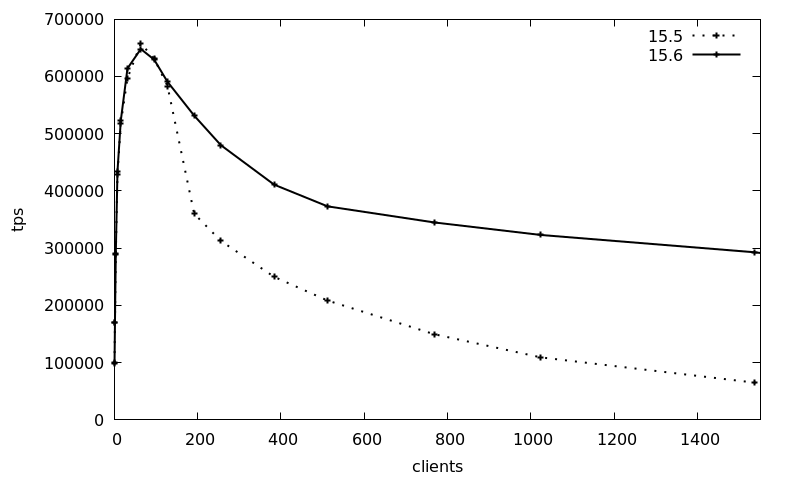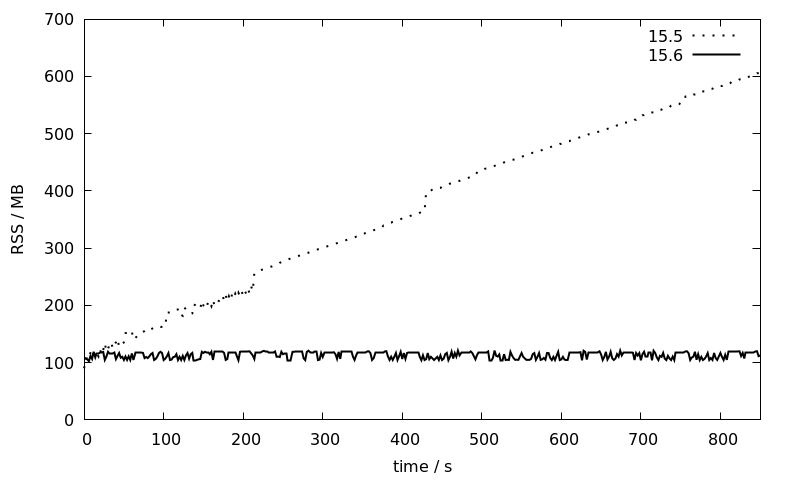Quick Benchmark: PostgreSQL 2024Q1 Release Performance Improvements
| Categories: | PostgreSQL® |
|---|---|
| Tags: | Benchmarks planetpostgresql PostgreSQL® |
The PostgreSQL 2024Q1 back-branch releases 16.2, 15.6, 14.11, 13.14 and 12.18 on February 8th 2024. Besides fixing a security issue (CVE-2024-0985) and the usual bugs, they are somewhat unique in that they address two performance problems by backporting fixes already introduced into the master branch before. In this blog post, we describe two quick benchmarks that show how the new point releases have improved. The benchmarks were done on a ThinkPad T14s Gen 3 which has a Intel i7-1280P CPU with 20 cores and 32 GB of RAM.
Scalability Improvements During Heavy Contention
The performance improvements in the 2024Q1 point releases concerns locking scalability improvements at high client counts, i.e., when the system is under heavy contention. Benchmarks had shown that the performance was getting worse dramatically for a pgbench run with more than 128 clients. The original commit to master (which subsequently was released with version 16) is from November 2022. It got introduced into the back-branches now as version 16 has seen some testing and the results were promising.
The benchmark we used is adapted from this post by the patch author and consists of a tight pgbench run simply executing SELECT txid_current() for five seconds each at increasing client count and measuring the transactions per second:
$ cat /tmp/txid.sql
SELECT txid_current();
$ for c in 1 2 4 8 16 32 64 96 128 192 256 384 512 768 1024 1536;
> do echo -n "$c ";pgbench -n -M prepared -f /tmp/txid.sql -c$c -j$c -T5 2>&1|grep '^tps'|awk '{print $3}';
> doneThe following graph shows the average transactions per second (tps) over 3 runs with increasing client count (1-1536 clients), using the Debian 12 packages for version 15, comparing the 2023Q4 release (15.5, package postgresql-15_15.5-0+deb12u1) with the 2024Q1 release (15.6, package postgresql-15_15.6-0+deb12u1):

The tps numbers are basically the same up to 128 clients, whereas afterwards the 15.5 transaction counts drops from the peak of 650k 10-fold to 65k. The new 15.6 release maintains the transaction count much better and still maintains around 300k tps at the 1536 clients, which is a 4.5-fold increase of the 2024Q1 release compared to previously.
This benchmark is of course a best-case, artificial scenario, but it shows that the latest point release of Postgres can improve scalability dramatically for heavily contested locking scenarios.
JIT Memory Consumption Improvements
JIT (just-in-time compilation with LLVM) was introduced in version 11 of Postgres and made the default in version 13. For a long time now, it has been known that long-running PostgreSQL sessions that run JIT queries repeatedly leak memory. There have been several bug reports about this, including some more in the Debian bug tracker and probably elsewhere.
This has been diagnosed to be due to JIT inlining and a work-around is setting jit_inline_above_cost to -1 from the default value of 500000. However, this disables JIT inlining completely. The 2024Q1 back-branch releases contain a backport of a change that will go into version 17: after every 100 queries, the LLVM caches are dropped and recreated, plugging the memory leak.
To show how the memory consumption has improved, we use the test case from this bug report. The benchmark is prepared as followed:
CREATE TABLE IF NOT EXISTS public.leak_test
(
id integer NOT NULL,
CONSTRAINT leak_test_pkey PRIMARY KEY (id)
);
INSERT INTO leak_test(id)
SELECT id
FROM generate_series(1,100000) id
ON CONFLICT DO NOTHING;Then, the process ID of the backend is noted and the SQL query mentioned in the bug report run 5000 times in a loop:
=> SELECT pg_backend_pid();
pg_backend_pid
----------------
623404
=> DO $$DECLARE loop_cnt integer;
-> BEGIN
-> loop_cnt := 5000;
-> LOOP
-> PERFORM
-> id,
-> (SELECT count(*) FROM leak_test x WHERE x.id=l.id) as x_result,
-> (SELECT count(*) FROM leak_test y WHERE y.id=l.id) as y_result
-> /* Leaks memory around 80 kB on each query, but only if two sub-queries are used. */
-> FROM leak_test l;
-> loop_cnt := loop_cnt - 1;
-> EXIT WHEN loop_cnt = 0;
-> END LOOP;
-> END$$;During this the memory consumption of the Postgres backend is recorded via pidstat:
pidstat -r -hl -p 623404 2 | tee -a leak_test.log.15.6
Linux 6.1.0-18-amd64 (mbanck-lin-0.credativ.de) 15.02.2024 _x86_64_ (20 CPU)
# Time UID PID minflt/s majflt/s VSZ RSS %MEM Command
12:48:56 118 623404 0,00 0,00 381856 91504 0,28 postgres: 15/main: postgres postgres [local] SELECT
12:48:58 118 623404 0,00 0,00 381856 91504 0,28 postgres: 15/main: postgres postgres [local] SELECT
12:49:00 118 623404 0,00 0,00 381856 91504 0,28 postgres: 15/main: postgres postgres [local] SELECT
12:49:02 118 623404 0,00 0,00 381856 91504 0,28 postgres: 15/main: postgres postgres [local] SELECT
12:49:04 118 623404 7113,00 0,00 393632 109252 0,34 postgres: 15/main: postgres postgres [local] SELECT
12:49:06 118 623404 13219,00 0,00 394556 109508 0,34 postgres: 15/main: postgres postgres [local] SELECT
12:49:08 118 623404 14376,00 0,00 395384 108228 0,33 postgres: 15/main: postgres postgres [local] SELECT
[...]The benchmark are again repeated for the 15.5 and 15.6 Debian 12 packages (which are both linked against LLVM-14) and the RSS memory consumption as reported by pidstat is plotted against time:

While the memory consumption of the 15.5 session increases linearly over time from 100 to 600 MB, it stays more or less constant at around 100 MB for 15.6. This is a great improvement that will make JIT much more usable for larger installations with long running sessions where so far the usual recommendation has been to disable JIT entirely.
Conclusion
The 2024Q1 patch release has important performance improvements for lock scalability and JIT memory consumption that we have demonstrated in this blog post. Furthermore, the patch release contains other important bug fixes and a security fix for CVE-2024-0985. This security issue is limited to materialized views and a admin user needs to be tricked into recreating a malicious materialized view on behalf of an attacker. But it has seen some german press coverage so quite a few of our customers were especially made aware of it and asked us to assist them with their minor upgrades. In general, Postgres patch releases are low-risk and unintrusive (just install the updated packages and restart the Postgres instances if the package did not do this itself) so that they should always be deployed as soon as possible.
| Categories: | PostgreSQL® |
|---|---|
| Tags: | Benchmarks planetpostgresql PostgreSQL® |
About the author
Michael Banck
about the person
Michael Banck ist seit 2009 Mitarbeiter der credativ GmbH, sowie seit 2001 Mitglied des Debian Projekts und auch in weiteren Open Source Projekten aktiv. Als Mitglied des Datenbank-Teams von credativ hat er in den letzten Jahren verschiedene Kunden bei der Lösung von Problemen mit und dem täglichen Betrieb von PostgreSQL®, sowie bei der Einführung von Hochverfügbarkeits-Lösungen im Bereich Datenbanken unterstützt und beraten.

